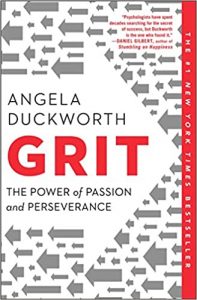59 – 4 Traits of a Gritty Writer

“I’ve tried, really hard, to interest agents and editors in my book. I’ve sent out 50 queries and I’ve received rejection after rejection.”
Sound familiar?
In the groups for writers that I belong to, I hear stories like this almost every day.
I began wondering what lengths an aspiring author would go to in hopes of getting their manuscript published. Would they pitch it 50 times? 100? 500? 1000?
What motivates a writer to have such faith in their project that they persevere for months or even years in the face of countless rejections?
It boils down to one word: Grit.
To flesh out what “grit” means and how we can apply this quality to our writing business, I’m going to share what I’ve been learning from a book by Angela Duckworth titled, Grit: The Power of Passion and Perseverance.
 Angela includes loads of fascinating and engaging interviews, anecdotes, stories, and case studies in her book. The story that intrigued me most was when Angela attended a presentation at her local library that featured Roz Chast, a cartoonist who is now 66 years old. Since 1978, she has had more than 800 cartoons in The New Yorker.
Angela includes loads of fascinating and engaging interviews, anecdotes, stories, and case studies in her book. The story that intrigued me most was when Angela attended a presentation at her local library that featured Roz Chast, a cartoonist who is now 66 years old. Since 1978, she has had more than 800 cartoons in The New Yorker.
Roz shared that, at this stage in her career, her rejection rate is about 90 percent. She said it used to be much, much higher.
Flabbergasted at what she viewed as an exceptionally high rejection rate and thinking this must be anomaly, Angela Duckworth contacted Bob Mankoff, who was the cartoon editor for The New Yorker for nearly 20 years.
He told Angela that most cartoonists live with even more rejection.
At The New Yorker, “contract cartoonists,” who have dramatically better odds of getting published than anyone else, collectively submit about five hundred cartoons every week. In a given issue, there is only room, on average, for about seventeen of them. That’s a rejection rate of more than 96 percent.
“Holy smokes! Who would keep going when the odds are that grim?” thought Angela.
Well, for one: Bob himself. Bob’s story reveals a lot about dogged perseverance toward a top-level goal. [Listen to the episode to hear how Angela recounts Bob’s story.]
4 ways to develop grit
How can we, as owners of writing-related businesses, develop grit — the capacity for long-term passion and perseverance?
1. Interest
“Passion begins with intrinsically enjoying what you do,” writes Angela Duckworth. It’s when you are so captivated and fascinated that you practically shout, “I love what I do!”
2. Practice
That’s the daily discipline of trying to do things better than we did yesterday. After you’ve discovered and developed interest in a particular area, you must devote yourself to the sort of focused, full-hearted, practice that leads to mastery.
You must zero in on your weaknesses, and you must do so over and over again, for hours a day, week after month after year. To be gritty is to resist complacency. “Whatever it takes, I want to improve!” is a refrain of all paragons of grit, no matter their particular interest, and no matter how excellent they already are.
3. Purpose
What ripens passion is the conviction that your work matters.
4. Hope
Hope is a rising-to-the-occasion kind of perseverance, writes Duckworth. It’s when we keep going even when things are difficult, even when we have doubts. At various points, in big ways and small, we get knocked down. If we stay down, grit loses. If we get up, grit prevails.
The great news is that these four qualities of grit – interest, practice, purpose, and hope – are learned habits. You can learn to discover, develop, and deepen your interests. You can acquire the habit of discipline. You can cultivate a sense of purpose and meaning. And you can teach yourself to hope.
Focus on one top-level professional goal
Pete Carroll, head coach of the Seattle Seahawks NFL team, develops grit by focusing on one top-level professional goal. That means paring down what is likely a long list of mid-level and low-level work-related goals to ONE goal that is of supreme importance.
Then you hold that same top-level goal for a very long time, and it is so interesting and important that it organizes a great deal of your waking activity.
Pete Carroll’s top-level goal:
Do things better than they have ever been done before.
That philosophy gives him – and his team – guidelines and boundaries that keep them on track.
Having one top-level goal is like having one internal compass. Instead of attempting to head north, south, east, and west simultaneously, your compass points one direction. You can then prioritize mid-level and low-level goals that serve the same ultimate purpose as your top-level goal.
When you set that top-level goal and employ the four qualities of grit – whether you win or lose a game, whether your book pitch is accepted or rejected 50 times – you hold steady. You endure. You continue practicing. You do that thing you love to do better than you’ve ever done it before. And tomorrow, you do it better than you did it yesterday.
That’s grit. That’s the power of passion, combined with perseverance.
Related Episodes about Grit and Mindset
Episode #3
Going ALL IN
Episode #12
Setting Big, Hairy, Audacious Goals
Episode #5
Is a B- Launch Good Enough?
Episode #22
“Don’t write because you want to get published. Write because you enjoy writing.” With Tessa Afshar
Episode #36
The Two Most Common Issues That Hold Writers Back, with Ginny L. Yttrup
Episode #9
Being True to Yourself
Episode #10
Moving from Self-Focused to Self-Forgetful
Episode #44
Simplify Your Areas of Influence
Episode #52
Shaping a ‘Reader First’ Mindset, with Samantha Hanni
How to Keep Up With the Show
Click here to join my my email list and I’ll notify you about every episode. (When you subscribe, you’ll also get my free guide, Essential Resources for Running a Writing Business.)
Join The Professional Writer Podcast Community (private Facebook group), where we discuss what we’re learning, meet our guests, and encourage one another on our writing journeys.
If you know a writer who would be interested in The Professional Writer Podcast, please share this link with them:
https://bloggingbistro.com/podcast
Thank you!
Laura


